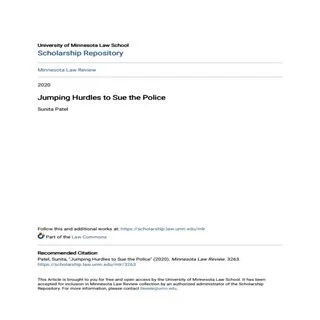Jumping Hurdles to Sue the Police
By Sunita Patel
During the tenure of President Barack Obama, scholars and advocates viewed the best route for federal court review of police practices to be consent decrees negotiated between municipal police departments and the Special Litigation Section in the Civil Rights Division of the Department of Justice (DOJ) pursuant to 28 U.S.C. § 14141.1 DOJ fact-finding reports and settlements, like the one in Ferguson, Missouri, exposed egregious practices and sought a culture shift by decrees in police departments across the country. The DOJ Process sometimes also bolstered mobilization to achieve police reform already underway outside the court. Today, the current Administration has taken an official position against using 28 U.S.C. § 14141 authority in favor of potentially unconstitutional exercises of police discretion. Although the federal executive branch is no longer a driving force behind police reform litigation, the institution of policing is no less harmful to Black and Brown communities. Thus, the questions motivating this Article are: “What can legal advocates do now? How can communities and their lawyers mobilize within the legal process?” Without the DOJ’s involvement, injured communities interested in court intervention may turn to section 1983 impact litigation, and what legal scholarship terms public law, public interest, or structural reform litigation. Rather than seek monetary damages against particular officers for abusive conduct against individual plaintiffs, structural reform litigation seeks redress from police departments and municipalities for their law enforcement practices and policies. Its goal is to achieve an injunction against, or change in the policies or practices of, a governmental entity. These are cases typically brought as class actions. Legal scholars have pointed to conservative judicial appointments and Supreme Court doctrine as causes for the shrinking of liberal structural reform litigation. Scholars’ views range from “[t]he courthouse door is closed,” to “procedure and doctrine make it really difficult to obtain substantive review of civil rights and constitutional harms”.
104 Minnesota Law Review 2257 (2020),


